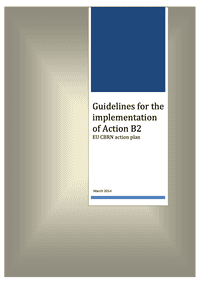European Biosecurity Regulation Forum Guidelines for the implementation of Action B2
[European Biosecurity Forum Guidelines]
This document is a guide for EU member states to implement the EU Chemical, Biological, Radiological, and Nuclear Security (CBRN) Action Plan Action B2, bringing them into compliance with UN Security Council Resolution 1540 and the Biological and Toxin Weapons Convention (BTWC). The EU CBRN Action Plan aims to strengthen CBRN security in the European Union, and Action B2 specifically calls on Member States to establish secure protocols and registrations for handling high risk biological agents and toxins.
SUMMARY
This document is a guide for EU member states to implement the EU Chemical, Biological, Radiological, and Nuclear Security (CBRN) Action Plan Action B2. The EU CBRN Action Plan aims to strengthen CBRN security in the European Union, and Action B2 specifically calls on Member States to establish secure protocols for handling high risk biological agents and toxins. These protocols for each Member State include: establishing a registry of facilities possessing any substances on the EU list of high risk biological agents and toxins; verifying whether facility security is adequate; and creating a mechanism for record-keeping and regularly reviewing the need for use of high risk biological agents and toxins. Countries that implement these protocols should achieve compliance with UN Security Council Resolution 1540 and the Biological and Toxin Weapons Convention (BTWC). This version of the Guidelines was developed by European experts from Denmark, France, The Netherlands, Sweden, the United Kingdom, and Switzerland, and released in March 2014. They are available as an English language PDF.
This guidance was released by the European Biosecurity Regulators Forum (EBRF), a working group with the mission to strengthen European biosecurity and representatives from Denmark, France, The Netherlands, Sweden, Switzerland, and the United Kingdom. The group originally convened in 2013-2014 to focus on securing biological substances with dual-use potential in line with the EU CBRN Action Plan. Since 2014, the group continued cooperating to raising awareness of biosecurity and dual-use issues.


..png)
